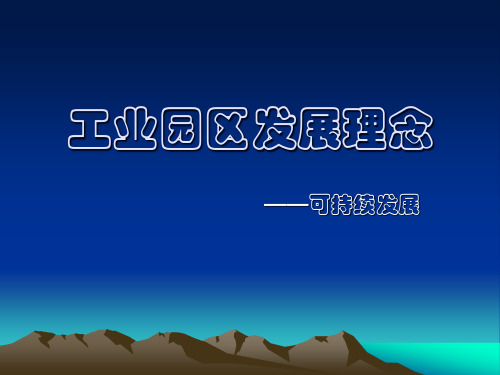“可持续发展”的英文名探讨
- 格式:pdf
- 大小:244.09 KB
- 文档页数:4

可持续发展的英文定义Sustainable development is a development model that meets the needs of the present generation without compromising the ability of future generations to meettheir own needs. It is an approach that aims to balance economic, social, and environmental considerations, ensuring that development is both equitable and sustainable over the long term.The concept of sustainable development emerged in the early 1980s, with the publication of the "World Conservation Strategy" by the International Union for Conservation of Nature (IUCN), the United Nations Environment Programme (UNEP), and the World Wildlife Fund (WWF). This document introduced the idea of sustainable development as a strategy for managing natural resources, focusing on the need to balance economic growth with environmental protection.In 1987, the World Commission on Environment andDevelopment (WCED), chaired by Gro Harlem Brundtland, published its report "Our Common Future," which provided a more comprehensive definition of sustainable development. The report stated that sustainable development is "development that meets the needs of the present without compromising the ability of future generations to meettheir own needs." This definition has become widely accepted and is now considered the foundation of sustainable development theory.Sustainable development is a complex concept that involves multiple dimensions, including economic growth, social equity, and environmental protection. It recognizes that development must be inclusive, ensuring that all people have access to the benefits of development, while also being sustainable, meaning that it does not deplete natural resources or harm the environment in ways that cannot be reversed.Economic growth is a critical component of sustainable development, as it provides the means to address social and environmental challenges. However, this growth must beachieved in a way that does not牺牲 the environment or the future of future generations. This requires a shift towards more sustainable production and consumption patterns, aswell as the development of green technologies andindustries that can drive economic growth without causing environmental degradation.Social equity is another key component of sustainable development. It recognizes that development must be inclusive, ensuring that all people, regardless of their social, economic, or geographic background, have access to the benefits of development. This requires a commitment to reducing poverty, inequality, and social exclusion, as well as promoting education, health, and other basic human needs.Environmental protection is also a fundamental aspectof sustainable development. It recognizes that the environment is a finite resource and that human activities have a significant impact on the natural world. Therefore, sustainable development requires a commitment to reducing environmental degradation, conserving biodiversity, and promoting sustainable use of natural resources. Thisincludes measures such as reducing greenhouse gas emissions, promoting renewable energy, and implementing sustainable land use practices.The implementation of sustainable development requiresa multi-stakeholder approach, involving governments, businesses, communities, and individuals. Governments playa crucial role in setting policies and regulations that promote sustainable development, while businesses have a responsibility to adopt sustainable practices and invest in green technologies. Communities and individuals also play a role by promoting sustainable living practices and participating in local environmental initiatives.In conclusion, sustainable development is a complex and multifaceted concept that aims to balance economic, social, and environmental considerations. It represents a new development model that is necessary to address the challenges of the 21st century, including climate change, resource scarcity, and social inequality. By committing to sustainable development, we can ensure that futuregenerations will inherit a world that is healthy, prosperous, and sustainable.。

“可持续发展” (Sustainable Development) 是上世纪八十年代提出的一个新概念,是人类对发展的认识深化的重要标志。
1987年,世界环境与发展委员会在《我们共同的未来》报告中,首次阐述了“可持续发展”的概念。
报告指出,所谓“可持续发展”,就是要在“不损害未来一代需求的前提下,满足当前一代人的需求”。
换句话说,可持续发展就是指经济、社会、资源和环境保护协调发展,既要达到发展经济的目的,又要保护好人类赖以生存的大气、淡水、海洋、土地和森林等自然资源和环境,使子孙后代能够永续发展和安居乐业。
可持续发展的核心是发展,但要求在保持资源和环境永续利用的前提下实现经济和社会的发展。
目前,可持续发展已经成为全球长期发展的指导方针。
它由三大支柱组成,旨在以平衡的方式,实现经济发展、社会发展和环境保护。
为有效实施可持续发展,1992年6月,118个国家的元首或政府首脑齐聚巴西里约热内卢,讨论实施可持续发展的具体方法。
在这个被称为“地球首脑会议”的大会上,世界各国领导人通过了《21世纪议程》《气候变化框架公约》等一系列文件。
会议确立了“可持续发展”理念,并用可持续发展概念,代替了工业革命以来那种“高消耗、高投入、高污染”不可持续的生产和消费方式。
1992年12月,联合国大会还设立可持续发展委员会,以确保环发会议成果得到有效落实。
在2002年9月南非约翰内斯堡举行的可持续发展世界首脑会议上,与会领导人通过了《约翰内斯堡可持续发展承诺》和《执行计划》,其中规定了重点更加突出的方针做法,既有具体步骤,又有可以量化和有时间限制的大小目标。
大会还将消除贫困纳入可持续发展理念之中。
在2012年的“里约+20”峰会上,加强可持续发展机制建设成为本次峰会的主要议题。
有效促进可持续发展的机制框架,是充分执行《21世纪议程》《执行计划》和应对各种新挑战的重要条件,不仅有助于统筹经济、社会和环保,而且有助于提高发展中国家的发言权和决策权,还有助于解决发展中国家资金、技术和能力建设等实际困难。

绿色和可持续发展的英语作文In today's world, the concept of green and sustainable development has become increasingly important. With the growing awareness of environmental issues and the impact of human activities on the planet, it is crucial for individuals, businesses, and governments to prioritize sustainability in all aspects of life. In this essay, Iwill explore the significance of green and sustainable development, its benefits, and the challenges that come with implementing it. Additionally, I will discuss the role of individuals, businesses, and governments in promoting sustainability and the potential solutions to overcome the obstacles in achieving a greener and more sustainable future.First and foremost, green and sustainable development is essential for the preservation of our planet and the well-being of future generations. The rapidindustrialization and urbanization have led to environmental degradation, depletion of natural resources,and climate change. It is evident that the currenttrajectory is not sustainable, and urgent action isrequired to mitigate the impact of human activities on the environment. By embracing green and sustainable development, we can reduce our carbon footprint, conserve natural resources, and protect biodiversity, ultimately creating a healthier and more balanced ecosystem for all living beings.Furthermore, green and sustainable development offers numerous benefits to society, the economy, and the environment. From a social perspective, it promotes a healthier and more equitable society by improving public health, providing access to clean air and water, andcreating green spaces for recreational activities. Economically, it stimulates innovation, creates new job opportunities, and reduces the long-term costs associated with environmental degradation. Environmentally, it helpsto mitigate climate change, conserve natural habitats, and protect endangered species. Overall, green and sustainable development is a win-win solution that fosters a harmonious relationship between humans and nature.Despite the undeniable benefits of green and sustainable development, there are several challenges that hinder its widespread adoption. One of the major obstacles is the lack of awareness and understanding of the importance of sustainability among individuals and communities. Many people are still unaware of the environmental impact of their daily choices and the long-term consequences of unsustainable practices. Additionally, there is a lack of incentives and policies to encourage businesses to adopt sustainable practices and invest in green technologies. Moreover, the transition to a green economy requires significant investment in research and development, as well as changes in infrastructure and production processes, which can be costly and time-consuming.In order to overcome these challenges, it is crucialfor individuals, businesses, and governments to play an active role in promoting green and sustainable development. As individuals, we can make a difference by adopting sustainable lifestyle choices such as reducing our energy consumption, minimizing waste, and supporting eco-friendlyproducts and businesses. By raising awareness and leadingby example, we can inspire others to join the movement towards sustainability. Businesses also have aresponsibility to integrate sustainable practices intotheir operations, supply chains, and corporate strategies. This may involve investing in renewable energy, improving energy efficiency, reducing waste, and implementing sustainable sourcing and production methods. Furthermore, governments play a critical role in creating an enabling environment for green and sustainable development through the implementation of policies, regulations, and incentives. This may include setting emission reduction targets, promoting renewable energy, providing subsidies for sustainable initiatives, and enforcing environmental standards.In conclusion, green and sustainable development is a vital concept that holds the key to a more prosperous and balanced future for humanity and the planet. It is imperative for individuals, businesses, and governments to work together towards achieving a more sustainable way of life. By embracing green and sustainable development, wecan protect the environment, improve public health, stimulate economic growth, and create a better world for future generations. It is time to take action and make a positive impact on the world around us.。
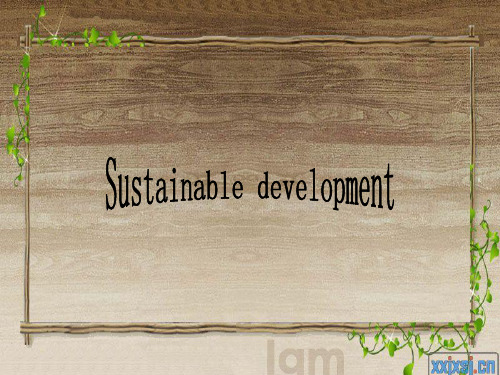
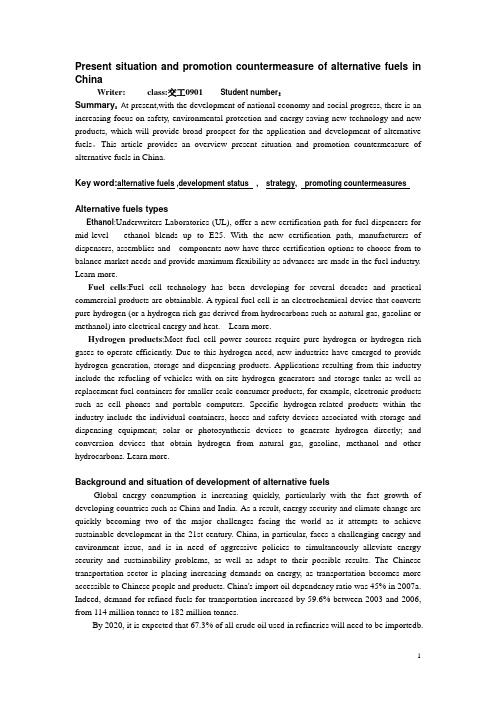
Present situation and promotion countermeasure of alternative fuels in ChinaWriter: class:交工0901 Student number:Summary:A t present,with the development of national economy and social progress, there is an increasing focus on safety, environmental protection and energy saving new technology and new products, which will provide broad prospect for the application and development of alternative fuels。
This article provides an overview present situation and promotion countermeasure of alternative fuels in China.Key word:alternative fuels ,development status , strategy, promoting countermeasuresAlternative fuels typesEthanol:Underwriters Laboratories (UL), offer a new certification path for fuel dispensers for mid-level ethanol blends up to E25. With the new certification path, manufacturers of dispensers, assemblies and components now have three certification options to choose from to balance market needs and provide maximum flexibility as advances are made in the fuel industry. Learn more.Fuel cells:Fuel cell technology has been developing for several decades and practical commercial products are obtainable. A typical fuel cell is an electrochemical device that converts pure hydrogen (or a hydrogen rich gas derived from hydrocarbons such as natural gas, gasoline or methanol) into electrical energy and heat. Learn more.Hydrogen products:Most fuel cell power sources require pure hydrogen or hydrogen rich gases to operate efficiently. Due to this hydrogen need, new industries have emerged to provide hydrogen generation, storage and dispensing products. Applications resulting from this industry include the refueling of vehicles with on-site hydrogen generators and storage tanks as well as replacement fuel containers for smaller scale consumer products, for example, electronic products such as cell phones and portable computers. Specific hydrogen-related products within the industry include the individual containers, hoses and safety devices associated with storage and dispensing equipment; solar or photosynthesis devices to generate hydrogen directly; and conversion devices that obtain hydrogen from natural gas, gasoline, methanol and other hydrocarbons. Learn more.Background and situation of development of alternative fuelsGlobal energy consumption is increasing quickly, particularly with the fast growth of developing countries such as China and India. As a result, energy security and climate change are quickly becoming two of the major challenges facing the world as it attempts to achieve sustainable development in the 21st century. China, in particular, faces a challenging energy and environment issue, and is in need of aggressive policies to simultaneously alleviate energy security and sustainability problems, as well as adapt to their possible results. The Chinese transportation sector is placing increasing demands on energy, as transportation becomes more accessible to Chinese people and products. China's import oil dependency ratio was 45% in 2007a. Indeed, demand for refined fuels for transportation increased by 59.6% between 2003 and 2006, from 114 million tonnes to 182 million tonnes.By 2020, it is expected that 67.3% of all crude oil used in refineries will need to be importedb.At the same time, China has only a rudimentary oil reserve system that will leave the country at risk if imports are interrupted. This situation is forcing China to consider increasing its domestic sources of energy. Although the domestic production of petroleum is increasing, import rates suggest that petroleum production is not increasing fast enough, and that other alternatives are required in order to ensure energy security for the country. While decreasing demand through energy efficiency is one important part of addressing transportation energy issues, increasing supply will also be essential. Internationally, both governments and multinational corporations have been aggressively promoting alternative energies such as natural gas, coal, biomass energy and renewable electricity so that dependence on petroleum can be reduced.China needs to continue to support and develop alternative energies, and complete a set of related policies, make use of preferential fiscal and tax regulations, invest more in science and technology and build technical expertise so as to establish a good base for industrialization and commercialization of alternative energies and be well prepared to assume a strategic commanding position in new energy development.For the purposes of countering potential fuel shortages, China has recently supported various types of alternative fuel development, particularly biofuels and coal to liquid fuels. However, in order to ensure the orderly development of this industry, and avoid waste associated with overinvestment, development of these types of fuel chains has been limited to a few large and trusted companies – and in fact to only a few projects, especially in the coal to liquid sector. 1. Biofuels China has supported the development of biofuels through laws such as the Renewable Energy Law of the PRC (2006), through national plans on economy and energy such as The "11th Five-Year Plan" Outlines for Economy and Social Development of the PRC (2006), and The Middle and Long Term Development Plan for Renewable Energies, to name a few. The latter plan defines bioethanol production targets using non-food raw materials at 2 Mt per year by 2010, and 10 Mt per year by 2020. The same plan defines biodiesel targets of 200 kt per year by 2010 and 2 Mt per year by 2020.Role of the development and promotion of alternative fuels and it is of great significance.In my view, created ecological role in the development and promotion of alternative fuels and it is of great significance.First, improving urban air quality. In the service industry in China, accounted for a considerable proportion of the catering trade. As the Government and public environmental awareness-raising and the perfection of environmental policy, is bound to the cleaner fuel in the direction of the catering trade, and environmental water alternative fuels is in line with this trend.Second, to extend the industrial chain, form a circular economic pilot. The last century, most developed countries methanol production of petroleum and natural gas as raw materials, and fertilizer producing methanol with coal production in China. Seemingly high cost of backward technology, at that time, but today in the oil crisis, with coal production showed alternative liquid fuel resources. Coal-methanol technology in China is the world leading level. Rich coal gangue resources available throughout, and gradually form a circular chain of coal gangue-methanol-alternative fuels. Therefore, the development of new environment-friendly alternative fuels can promote the development of coal deep processing industry and a variety of comprehensive utilization of tail gas, by-products, its far-reaching.Three is to cultivate and strengthen the environmental pillar industries. Diversification of energy structure has become an irreversible trend of the world, methanol production of technical, economic demonstrated: methanol fuel chemical energy of the system has become a development direction. With the rising international oil prices, rising domestic oil product prices, hotel, hotel before using diesel as fuel, new environment-friendly alternative fuels now preferred. Achieve environmental protection industrialization of alternative fuels, can not only improve the distribution of some environmental protection industry in the small, scattered, low productivity of the status quo, and in the formation of local environmental pillar industries.Promotion of alternative fuels in China strategyDevelopment of alternative energy sources is the responsibility of the whole society. We should actively call for creating industry development environment, development and application of new alcohol based fuels, promote their healthy development. Recommends that the relevant government departments should be concerned about, and related work carried out as soon as possible. Related enterprises will have to Think globally, act locally, as masters of attitude and strong sense of social responsibility, without returning to take to promote environmental protection industrialization development of alcohol-based fuels. I propose the following: Set up a technology centre of new environment-friendly alcohol-based fuel industry and Association, and manpower management, planning, coordination of the development of new fuels, renovation, construction, production and use, further play to the advantages of combining, as soon as its industrialization and commercialization.All levels of Government should be given the necessary policy and financial support, including the promotion of pilot start-up funds, new fuels and new cooking appliances such as research and development. In the area of tax policy, new kind of alcohol based fuels proposed exemption or reduction of environmental protection policies.Adhering to system integration innovation, in the new environment-friendly alcohol fuel in industrial practice, focused on addressing environmental common and critical problems in the application of alcohol fuel, transport, storage, sales and raise using links, around core technologies form the system integration process, promote industrialization project skills.Application and popularization of hydrogen fuelHydrogen is the 21st century to solve the energy crisis and the fossil of green energy to alleviate environmental problems. To achieve the use of hydrogen energy, hydrogen storage and transportation is the key issue to be resolved. This paper summarizes the preparation technology and storage of hydrogen technology, the latest research advances, and to explore the hydrogen production and hydrogen storage technology, the key issue. Finally, prospects for further progress in the study presented the direction for the study of the subject.As an energy source, hydrogen has the unparalleled potential development value: Hydrogen is the most common element in nature, it is mainly in the form of compounds stored in the water, but water is the most widely used material on earth; In addition to nuclear fuel, the hydrogen heat the value of all fossil fuels, chemicals and bio-fuels, the highest fuel; hydrogen combustion performance is good, light fast, and air mixture when the scope of a wide range of combustible and burning high, burning speed; hydrogen itself is non-toxic, when compared with other fuels the cleanest burning hydrogen. The use of multiple forms of hydrogen, either through the combustionheat generated in the heat engine mechanical work, but also the materials used in fuel cells as an energy source, or converted into solid hydrogen as a structural material. Hydrogen instead of coal and oil, without the existing technology and equipment to make a major transformation, now slightly modified internal combustion engine can be used. All gases, the best thermal conductivity of hydrogen, the gas thermal conductivity than most 10 times higher in the energy industry, hydrogen is an excellent heat transfer carrier. Therefore, examine the use of hydrogen has become the hot domestic and foreign academics who have studiedDevelopment of a hydrogen at home and abroadNovember 2003 19-21 in Washington, DC Ou Mini Seaham Grand Hotel, 'International Partnership for Hydrogen Economy organizations' [The International Partnership For The Hydrogen Economy (IPHE)] the inaugural meeting, there were Australia, Brazil, Canada, , China, France, Germany, Iceland, India, Italy, Japan, South Korea, Russia, Britain, the United States and the European Union government delegations and business representatives from the industry hundreds of people attended the conference. IPHE is a new international partnership for hydrogen energy, such cooperation will support the future of hydrogen and electric vehicle technology to build a safe, efficient and economical worldwide hydrogen production, storage, transportation, distribution and use of facilities large-scale system. Hydrogen so as to solve the current dilemma facing humankind a new energy and become countries have been vigorously object of study.Hydrogen widely used hinges on developing a low-cost hydrogen technologies. At present, the use of hydrogen technology development has been the world's major developed countries and developing countries to initiate and achieve varying degrees of success. The United States has successfully developed the world's first hydrogen fuel a car can be 60% -80% of the hydrogen converted into kinetic energy, the energy conversion rate than double the normal internal combustion engine. In 1989, the U.S. Pacific Energy Corporation invented mass production of cheap hydrogen to fuel new technologies. Can be used for water decomposition of a chemical catalyst. Break out in this way the cost of hydrogen is very low, thereby becoming the world's most expensive fuel [1-3,6].European Union (EU) has also stepped up the development and utilization of hydrogen energy. In 2002-2006, the European Union 6th Framework research programs, research on hydrogen and fuel cell investment of 2,500 million -3,000 million euros, compared with the previous framework program for a one-fold increase. The Nordic countries in 2005 set up the 'Nordic energy research institutions', through the systematic analysis of biological hydrogen production, improve the ability of biological production of hydrogen. In July 2005, Germany's BMW (BMW) Motor Co. unveiled a new hydrogen fuel vehicle, full use of hydrogen will not cause air pollution and can generate a powerful driving force of the two main advantages. The car speeds up to 226 km / h, moving the limit up to 400 km / h. Earlier Japanese research hydrogen present, hydrogen fuel cells are the main development direction of Japan. Japanese Government to promote the practical use and popularization of hydrogen, and further improved vehicle fuel supply system throughout the country to build a lot of 'hydrogen filling station', now has nearly one hundred vehicles, fuel cell vehicles have been licensed and the road, plans will be developed by 2030 to 15 million [1-6].For my country, energy development strategy is to focus on national economic development strategy, China's proven recoverable reserves of fossil fuels, coal, oil, natural gas accounted for 11.6% of the world's reserves, 2.6%, 0.9%. Coal as the world average per capita 1 /2, oil is only 1 / 10 or so, China's large population, a serious shortage of per capita resources. Therefore, the search for new clean energy to China's sustainable development is particularly important.ConclusionThe international energy industry forecasts, in the 21st century community will bid farewell to fossil fuels into the ethanol,fuel cells and hydrogen economy era. Looking at the world's energy development strategy, the experts believe that ethanol,fuel cells and hydrogenwill replace oil by 2050 as the main energy sources, mankind will enter a complete ethanol,fuel cells and hydrogeneconomy and society.At present, China's sustained rapid economic growth, energy demand continued to rise, energy and strategic reserves perilously low, the volatility of the international oil market in China has obvious implications for economic and social development, the resulting conflict has become the containment of China's long-term health for sustainable development Strategic bottlenecks. Start the first round in China for long-term ethanol,fuel cells and hydrogeneconomy is a key strategic advantage. Therefore, the concentration of superior forces to develop clean and efficient ethanol,fuel cells and hydrogenenergy may be the first to enter the ethanol,fuel cells and hydrogeneconomy in China, out of hundreds of years science, technology and strategy behind the path of sustainable and healthy development of the best starting point.Energy-saving emission reduction, environmental protection to achieve sustainable development of mankind an urgent requirement, and clean energy development and utilization, is a practical road to ethanol,fuel cells and hydrogeneconomy as the dominant model of industrial economy in the future can be expected to give enormous changes in human life. ethanol,fuel cells and hydrogenenergy research stage is broad, and research and development of ethanol,fuel cells and hydrogenenergy will accomplish a great deal. .ReferencesLiterature1.WANG Yu-jin1,2(1.College of Mechanical Engineering,Taiyuan university of Technology,Taiyuan 030024,China;2.Mechenical Electrical Dpartment,Taiyuan University,Taiyuan030009,China);Development Exploring of Alternative Fuels for Engine[J];Journal of Taiyuan University;2007-022,XIAO Li-qi~1,TANG Hao-lin~2(1.School of Materials Science and Technology Wuhan University of Technology,Wuhan,Hubei 430070,China;2.State Key Laboratory of Advanced Technology for Materials Synthesis and Progressing,Wuhan University of Technology,Wuhan,Hubei 430070,China);Exploitation and Application for Hydrogen Energy-The New Automobile Substituting Fuel[J];Applied Energy Technology;2006-103.MAO Zong qiang (INET Qinghua University, Beijing 100084, China);Forwards to hydrogen energy ——State-of-art, difference and strategy of Chinese fuel cell industry[J];Chinese Journal of Power Sources;2003-S14.Zhang Juntao Liang Shengrong Ding Liqin ( Institute of Chemical Engineering , Xi' an Petroleum University, Xi'an 710065);Clean Alternative Fuels for Vehicle Engines and Development Prospect[J];Advances in Fine Fetrochemicals;2005-04。
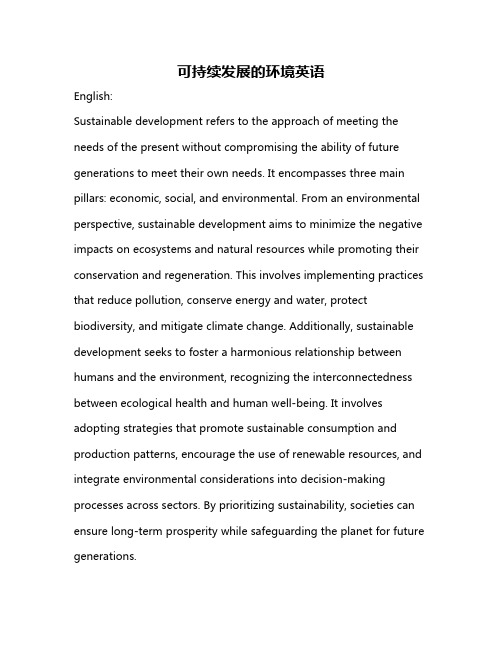
可持续发展的环境英语English:Sustainable development refers to the approach of meeting the needs of the present without compromising the ability of future generations to meet their own needs. It encompasses three main pillars: economic, social, and environmental. From an environmental perspective, sustainable development aims to minimize the negative impacts on ecosystems and natural resources while promoting their conservation and regeneration. This involves implementing practices that reduce pollution, conserve energy and water, protect biodiversity, and mitigate climate change. Additionally, sustainable development seeks to foster a harmonious relationship between humans and the environment, recognizing the interconnectedness between ecological health and human well-being. It involves adopting strategies that promote sustainable consumption and production patterns, encourage the use of renewable resources, and integrate environmental considerations into decision-making processes across sectors. By prioritizing sustainability, societies can ensure long-term prosperity while safeguarding the planet for future generations.中文翻译:可持续发展指的是在满足当前需求的同时,不损害未来世代满足其自身需求的能力的一种方法。
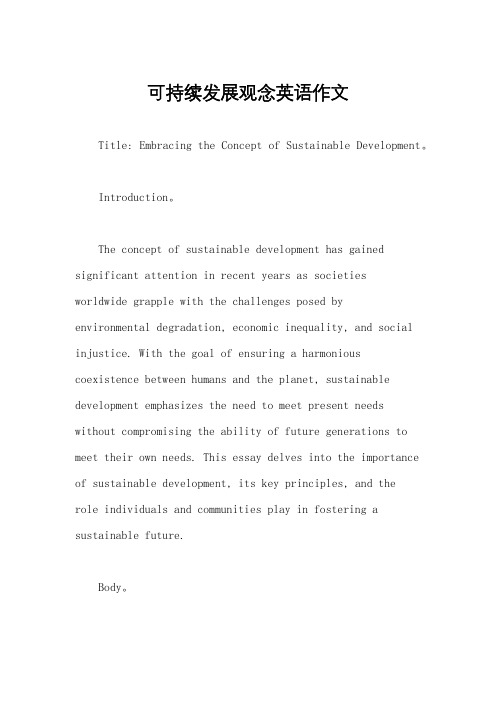
可持续发展观念英语作文Title: Embracing the Concept of Sustainable Development。
Introduction。
The concept of sustainable development has gained significant attention in recent years as societiesworldwide grapple with the challenges posed byenvironmental degradation, economic inequality, and social injustice. With the goal of ensuring a harmonious coexistence between humans and the planet, sustainable development emphasizes the need to meet present needswithout compromising the ability of future generations to meet their own needs. This essay delves into the importance of sustainable development, its key principles, and therole individuals and communities play in fostering a sustainable future.Body。
1. Definition and Importance of Sustainable Development。
Sustainable development refers to a holistic approach that integrates economic, social, and environmental dimensions to achieve long-term well-being for both current and future generations. It recognizes the interconnectedness of various systems and aims to strike a balance between economic growth, social progress, and environmental protection. The significance of sustainable development lies in its ability to address pressing global challenges, such as climate change, poverty, and resource depletion, while ensuring a prosperous and equitable future for all.2. Key Principles of Sustainable Development。
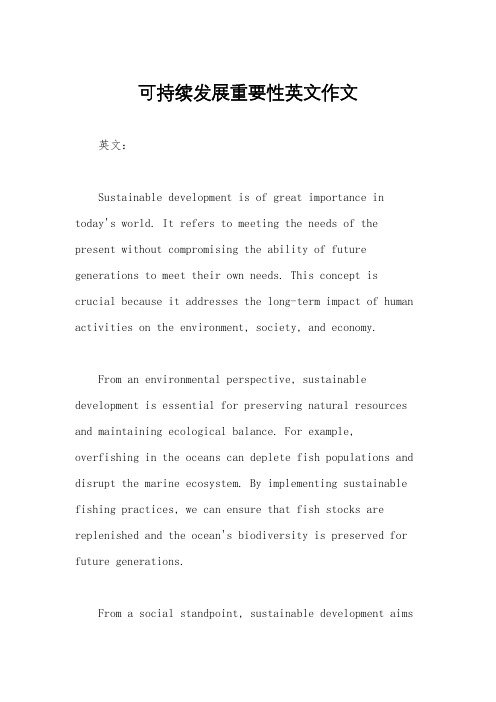
可持续发展重要性英文作文英文:Sustainable development is of great importance in today's world. It refers to meeting the needs of the present without compromising the ability of future generations to meet their own needs. This concept is crucial because it addresses the long-term impact of human activities on the environment, society, and economy.From an environmental perspective, sustainable development is essential for preserving natural resources and maintaining ecological balance. For example, overfishing in the oceans can deplete fish populations and disrupt the marine ecosystem. By implementing sustainable fishing practices, we can ensure that fish stocks are replenished and the ocean's biodiversity is preserved for future generations.From a social standpoint, sustainable development aimsto improve the quality of life for all individuals while reducing inequality. Take, for instance, the issue of access to clean water. In many parts of the world, people lack access to safe drinking water, leading to health problems and economic hardships. By promoting sustainable water management and sanitation, we can ensure that everyone has access to this basic necessity, leading to healthier and more prosperous communities.Economically, sustainable development seeks to promote responsible consumption and production patterns that do not deplete natural resources or harm the environment. For instance, the fashion industry is notorious for its high levels of waste and pollution. By embracing sustainable fashion practices, such as using eco-friendly materials and reducing waste, the industry can minimize its environmental impact and contribute to a more sustainable future.In conclusion, sustainable development is crucial for addressing the interconnected challenges of environmental degradation, social inequality, and economic instability. By adopting sustainable practices in all aspects of life,we can create a more equitable and prosperous world for current and future generations.中文:可持续发展在当今世界中至关重要。

联合国可持续发展的英语作文Title: The Imperative of United Nations Sustainable DevelopmentThe concept of sustainable development, at its core, embodies the balance between meeting the needs of the present without compromising the ability of future generations to meet their own. It's a notion that is as old as humanity itself yet has become increasingly urgent in today's rapidly changing world. At the forefront of this global endeavor stands the United Nations, through its 2030 Agenda for Sustainable Development.In a world grappling with environmental degradation, economic disparities, and social injustice, the United Nations sustainable development goals (SDGs) serve as a beacon of hope and a roadmap for action. The 17 SDGs, ranging from ending poverty to combating climate change and promoting peace, are interlinked and emphasize an integrated approach to development. They acknowledge that environmental health, economic prosperity, and social well-being are not mutually exclusive but rather mutually reinforcing pillars of a sustainable future.Embracing this holistic vision requires a profoundunderstanding of the intricate connections that bind our planet and its inhabitants together. For instance, addressing poverty (SDG 1) is not merely a matter of charity but also of justice and economic prudence. A prosperous society free from poverty is more resilient to economic downturns and can better contribute to global markets. Similarly, achieving gender equality (SDG 5) is about more than social justice; it is about harnessing the full potential of half the world's population for innovation, decision-making, and economic growth.Moreover, the SDGs underscore the importance of sustainability in consumption and production patterns (SDG 12). Our oceans, forests, and biodiversity are not infinite resources to be exploited for short-term gains but critical assets that must be carefully managed to ensure long-term benefits for all. This goal highlights the necessity of transitioning towards renewable energy sources, reducing waste, and fostering sustainable agriculture and industries.However, the journey towards sustainable development is fraught with challenges. National interests often clash with global priorities, and the temptation for short-term gains can overshadow the imperative of long-term sustainability.Furthermore, the unequal distribution of power and resources across the globe exacerbates these challenges, making the collective action advocated by the UN's SDGs even more crucial yet daunting.In conclusion, the United Nations sustainable development agenda represents a monumental commitment by the global community to chart a course towards a more equitable, prosperous, and environmentally friendly future. While the goals are ambitious and the path is strewn with obstacles, they offer a harmonized framework within which nations can align their policies and actions. As we navigate the complexities of global development, it is imperative that we remember the words of Margaret Mead: "Never doubt that a small group of thoughtful, committed citizens can change the world; indeed, it's the only thing that ever has." The United Nations SDGs are a testament to this belief, calling on each of us to contribute, in our own way, to the shared vision of a sustainable future.。

可持续发展的重要性和意义英语作文全文共10篇示例,供读者参考篇1Sustainable development is super duper important! It means we gotta take care of the Earth so we can have a nice place to live not just for us, but for our kids and grandkids too.First of all, we need to think about the environment. If we keep using up all the resources and polluting the air and water, there won't be anything left for the future. That's not cool, right? So we need to recycle, use less plastic, and protect the animals and plants.Secondly, sustainable development is also about being fair to everyone. We shouldn't just think about ourselves, but also about people in other countries and future generations. We gotta make sure everyone has enough food, clean water, and a safe place to live.Lastly, sustainable development is about making sure we have enough resources for a long time. If we use up all the oil, gas, and coal now, we won't have any left for later. So we gotta find alternative energy sources and use resources wisely.In conclusion, sustainable development is super important because it's about taking care of the Earth, being fair to everyone, and making sure we have enough resources for the future. Let's all work together to make the world a better place for everyone!篇2Sustainable development is super duper important guys! It means making sure we can keep living our best lives without messing up the planet. We gotta take care of the environment for us and for future generations. If we use up all the resources now, there won't be any left for our grandkids!If we don't recycle and reduce waste, the earth will get all dirty and gross. Our air and water will be polluted, and animals will have nowhere to live. We need to plant trees, clean up trash, and save energy to protect our planet.Sustainable development also helps people in need. By using resources wisely, we can make sure everyone has enough food, water, and shelter. We can build schools, hospitals, and roads to help communities grow and thrive.So let's all work together to make sure we have a bright and happy future. We can all do our part to make a difference andprotect our planet for generations to come. Remember, it's cool to be kind to the earth!篇3Title: The Importance and Meaning of Sustainable DevelopmentHey guys! Do you know what sustainable development is? It's like when we take care of the Earth so that it can stay healthy for a long time. It's super important because if we don't take care of the Earth, we won't have clean air to breathe, clean water to drink, or enough food to eat.Sustainable development means using resources wisely so that we don't run out of them. For example, instead of cutting down all the trees in a forest, we should plant new ones to replace them. This way, the forest can keep providing us with clean air and animals have a home to live in. It also means using energy like sunlight and wind, which won't run out like fossil fuels do.Another important thing about sustainable development is taking care of animals and plants. If we keep cutting down forests and polluting rivers, many animals and plants will disappear forever. That's not cool, right? We need to protectthem so that they can stay around for future generations to enjoy.By being more sustainable, we can help make sure that the Earth stays healthy for a long time. We can reduce pollution, save energy, and protect plants and animals. It's our home, so let's take care of it together!篇4As a primary school student, I think sustainable development is super duper important! It means taking care of our planet so that we can have a great future. We need to use our resources wisely and not waste them. If we keep using up all the trees, water, and air, then there won't be anything left for us and for the animals.I learned in school that we need to recycle our trash, save energy by turning off lights and electronics when we're not using them, and use less plastic. If we all work together to do these things, we can make a big difference in the world.Sustainable development also means taking care of people. We need to make sure everyone has enough food, clean water, and a safe place to live. We should also help each other out andbe kind to one another. That way, we can all live happily together on this planet.So, let's all do our part to help with sustainable development. Even though we're just kids, we can still make a big impact. Let's be super eco-friendly and make sure our planet stays healthy for generations to come!篇5Sustainable development is super duper important! Do you know why? Because it's all about taking care of our planet and making sure there's enough resources for us and future generations. If we don't think about the environment and just keep using up all the resources, there won't be anything left for our kids and grandkids.One way we can help with sustainable development is by reducing, reusing, and recycling. That means using less stuff, finding new ways to use things we already have, and making sure to put things in the right bins so they can be turned into new things. It's like magic – we can make something old into something new!Another way to help is by using energy wisely. Turning off the lights when we leave a room, using less water when we brushour teeth, and walking or biking instead of always asking for a ride in the car. These little things might seem small, but they can make a big difference when we all work together.Remember, we all share this planet and it's our job to take care of it. So let's do our best to protect the Earth and make sure it stays healthy for a long, long time. Sustainable development rocks!篇6Title: The Importance and Significance of Sustainable DevelopmentHey everyone! Today I want to talk to you about something super important – sustainable development. Have you heard of it before? Well, if you haven't, no worries! I'm here to explain it to you.Sustainable development means taking care of our planet and making sure that future generations can have a good life too. It's like taking care of our toys so they don't break, but instead of toys, we're talking about the Earth! We need to make sure we use our resources wisely and not waste them.Why is sustainable development so important? Well, think about it – if we keep using up all the Earth's resources without thinking about the future, what will happen? We might run out of things like water, trees, and animals. And that would be really bad!But if we practice sustainable development, we can make sure that we have enough resources for everyone, now and in the future. We can protect our environment, animals, and plants. We can reduce pollution and make our planet a healthier place to live.So, what can we do to help with sustainable development? We can start by using less plastic, recycling our trash, saving water, and planting more trees. We can also learn about renewable energy sources like solar power and wind power.By working together and taking small steps, we can make a big difference! So let's all do our part to protect our planet and make sure it's a happy and healthy place for all of us. Remember, we only have one Earth, so let's take care of it!篇7Sustainable development is super duper important for our planet and for us, kids! It means that we gotta take care of theEarth now so that it will still be awesome for us and our kids in the future.First of all, sustainable development helps to protect the environment. We need clean air to breathe, clean water to drink, and a healthy planet to live on. If we keep cutting down trees, polluting the oceans, and using up all the resources, we won't have a nice place to live anymore. That's not cool, right?Secondly, sustainable development helps to make sure that everyone gets what they need. It's not fair if some people have lots of food, water, and other stuff while others don't have enough. By using resources wisely and sharing with others, we can make sure that everyone has enough to live a happy and healthy life.Finally, sustainable development helps to protect animals and plants. We share the Earth with lots of other living things, and they need our help to survive too. If we destroy their habitats and pollute their homes, they won't be able to live here anymore. That would be so sad!So let's all work together to take care of our planet and make sure that we can enjoy a beautiful, healthy, and happy Earth for many generations to come. Yay for sustainable development!篇8Sustainable development is super important, guys! It means taking care of our planet now so that we can still enjoy it in the future. We need to think about ways to use our resources wisely and protect the environment.First of all, we should reduce, reuse, and recycle. This means using less stuff, like plastic bags and bottles, and finding new uses for things instead of throwing them away. We can also recycle things like paper and cans so we can make new things without using up more resources.Next, we need to think about conserving energy. We can turn off lights when we're not using them and unplug electronics when we're not using them. We can also walk or ride our bikes instead of asking our parents to drive us everywhere. This helps reduce pollution and save energy!Another important thing is to protect wildlife and nature. We should not harm animals or destroy their habitats. We can plant trees and flowers to create homes for birds and insects. We can also avoid using harmful chemicals that can pollute our rivers and oceans.By practicing sustainable development, we can create a better world for ourselves and future generations. Let's work together to protect our planet and make sure it stays beautiful for a long time! Let's all do our part to make a difference!篇9Why is sustainable development important? Well, let me tell you all about it!First of all, sustainable development means taking care of our planet so that it can keep providing us with everything we need. This includes things like clean air, fresh water, and yummy food. If we don't take care of the Earth, we won't have these things anymore!Secondly, sustainable development is important because it helps us protect animals and plants. Just like us, they need clean air and water to survive. If we don't take care of the environment, many animals and plants could become extinct. That would be really sad!Thirdly, sustainable development is important for us humans too. If we use up all of the Earth's resources now, there won't be enough left for future generations. We need to make sure that there is enough for everyone, now and in the future.So, as you can see, sustainable development is super important! We need to take care of our planet, protect animals and plants, and make sure there is enough for everyone. Let's all work together to make the world a better place for everyone!篇10Sustainable development is really, really important for us and the Earth. It means we have to take care of the environment, make sure everyone has enough food and water, and make sure we use things wisely so there's enough for everyone now and in the future.If we don't take care of the Earth, there might not be enough clean water for us to drink or food for us to eat. Animals and plants might disappear, and the Earth could become a really sad place to live. That's why we need to make sure we use things like water, energy, and trees carefully and don't waste them.We can help by recycling our toys and bottles, turning off the lights when we leave a room, and planting trees. These may seem like small things, but they can make a big difference if everyone does them.Sustainable development is super important because it helps us live in harmony with nature and make sure we have a happy,healthy planet to live on. So let's all work together to protect the Earth and make sure we have a bright future ahead!。
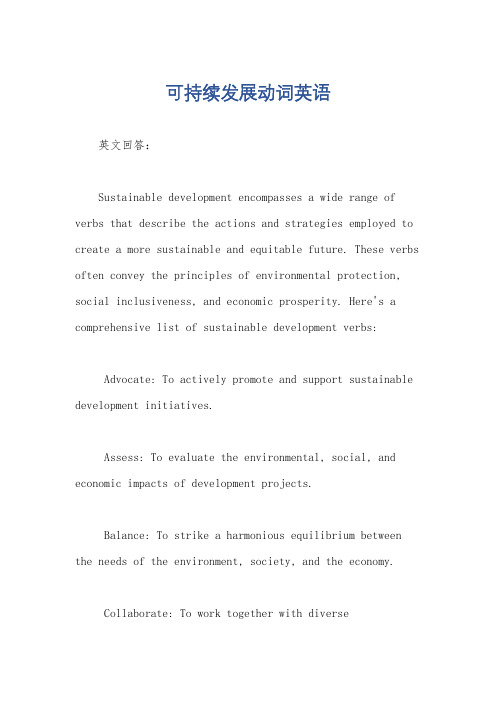
可持续发展动词英语英文回答:Sustainable development encompasses a wide range of verbs that describe the actions and strategies employed to create a more sustainable and equitable future. These verbs often convey the principles of environmental protection, social inclusiveness, and economic prosperity. Here's a comprehensive list of sustainable development verbs:Advocate: To actively promote and support sustainable development initiatives.Assess: To evaluate the environmental, social, and economic impacts of development projects.Balance: To strike a harmonious equilibrium between the needs of the environment, society, and the economy.Collaborate: To work together with diversestakeholders to achieve sustainable outcomes.Conserve: To protect and manage natural resources for future generations.Create: To develop innovative solutions and technologies that support sustainable development.Educate: To raise awareness and build capacity on sustainable development issues.Empower: To provide individuals and communities with the knowledge and resources they need to participate in sustainable development.Engage: To actively involve stakeholders in decision-making processes that affect sustainability.Foster: To nurture and promote sustainable practices and behaviors.Govern: To establish and implement policies andregulations that support sustainable development.Integrate: To incorporate sustainability principles into all aspects of planning and decision-making.Invest: To allocate resources to support sustainable development initiatives.Monitor: To track and evaluate progress towards sustainable development goals.Plan: To develop strategies and action plans for achieving sustainable development objectives.Preserve: To protect and maintain the natural environment for future generations.Promote: To encourage and support the adoption of sustainable practices.Protect: To safeguard the environment, human rights, and cultural heritage.Reduce: To minimize the negative environmental and social impacts of development activities.Research: To conduct scientific studies and gather data to inform sustainable development policies and practices.Share: To disseminate knowledge and best practices on sustainable development.Support: To provide financial, technical, or other assistance to sustainable development initiatives.Sustain: To maintain and improve the quality of life for present and future generations.Transform: To make fundamental changes to systems and practices to achieve sustainability.These verbs play a crucial role in shaping the language and discourse around sustainable development. Byunderstanding and using these verbs effectively, we can communicate more clearly about the actions and strategies needed to create a more sustainable and just world.中文回答:可持续发展涉及广泛的动词,这些动词描述了为创造一个更加可持续和公平的未来而采取的行动和策略。
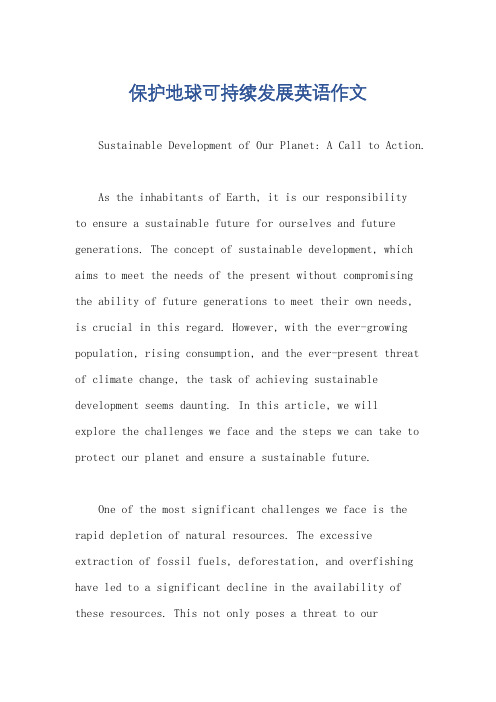
保护地球可持续发展英语作文Sustainable Development of Our Planet: A Call to Action.As the inhabitants of Earth, it is our responsibilityto ensure a sustainable future for ourselves and future generations. The concept of sustainable development, which aims to meet the needs of the present without compromising the ability of future generations to meet their own needs,is crucial in this regard. However, with the ever-growing population, rising consumption, and the ever-present threat of climate change, the task of achieving sustainable development seems daunting. In this article, we willexplore the challenges we face and the steps we can take to protect our planet and ensure a sustainable future.One of the most significant challenges we face is the rapid depletion of natural resources. The excessive extraction of fossil fuels, deforestation, and overfishing have led to a significant decline in the availability of these resources. This not only poses a threat to oureconomic well-being but also has devastating consequencesfor the environment. The carbon emissions resulting fromthe combustion of fossil fuels are a major contributor to climate change, leading to extreme weather events, melting ice caps, and rising sea levels.To address this challenge, we need to transition to renewable energy sources such as solar, wind, and hydroelectric power. We must also adopt energy-efficient technologies and practices to reduce our energy consumption. Additionally, we must conserve our natural resources by promoting sustainable agriculture, reducing waste, and recycling.Another challenge is the growing urbanization and industrialization, which lead to increased pollution and environmental degradation. The discharge of toxic chemicals and waste into our water bodies and air has led to widespread pollution, affecting both human health and the ecosystem.To mitigate this problem, we need to implement strictenvironmental regulations and enforce them effectively. We must also promote sustainable urban planning and design, including green infrastructure and eco-friendly building materials. Furthermore, we should encourage industries to adopt cleaner production methods and technologies to reduce pollution and waste generation.Climate change is another major threat to our planet's sustainability. The increasing greenhouse gas emissions are causing global warming, leading to melting ice caps, rising sea levels, and extreme weather events. These changes not only affect our environment but also have significantsocio-economic implications.To address climate change, we need to reduce our greenhouse gas emissions quickly and significantly. This requires a comprehensive approach, including the transition to renewable energy, energy efficiency improvements, and the adoption of low-carbon technologies. Additionally, we should promote afforestation and reforestation to absorb carbon dioxide from the atmosphere. International cooperation is also crucial in this regard, as climatechange is a global issue that requires global solutions.However, achieving sustainable development is notsolely about addressing these challenges. It also involves ensuring social and economic well-being, particularly for the vulnerable sections of society. This requires aholistic approach that integrates environmental, social, and economic considerations.We need to promote inclusive and sustainable economic growth that benefits all sections of society. We should prioritize investment in education, healthcare, and infrastructure to improve living conditions and create opportunities for all. Additionally, we should encourage innovation and technology transfer to promote sustainable development in developing countries.In conclusion, achieving sustainable development is a challenging but necessary task. It requires a concerted effort from all stakeholders, including governments, industries, communities, and individuals. By addressing the challenges we face, implementing effective solutions, andpromoting inclusive and sustainable economic growth, we can protect our planet and ensure a sustainable future for ourselves and future generations. Let us come together and take action to build a better, more sustainable world.。
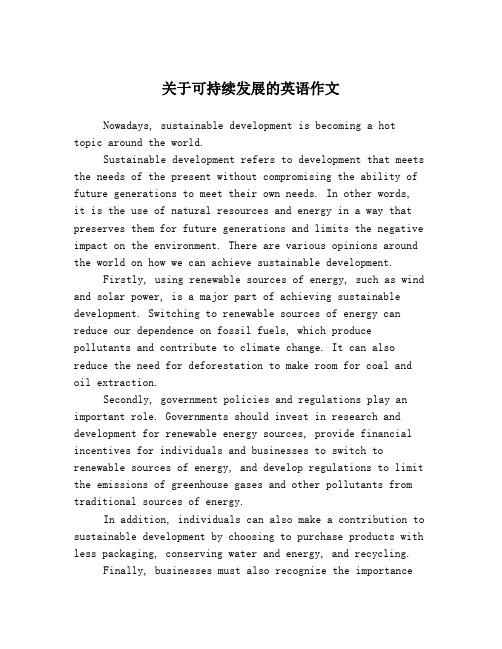
关于可持续发展的英语作文Nowadays, sustainable development is becoming a hottopic around the world.Sustainable development refers to development that meets the needs of the present without compromising the ability of future generations to meet their own needs. In other words,it is the use of natural resources and energy in a way that preserves them for future generations and limits the negative impact on the environment. There are various opinions around the world on how we can achieve sustainable development.Firstly, using renewable sources of energy, such as wind and solar power, is a major part of achieving sustainable development. Switching to renewable sources of energy can reduce our dependence on fossil fuels, which produce pollutants and contribute to climate change. It can also reduce the need for deforestation to make room for coal and oil extraction.Secondly, government policies and regulations play an important role. Governments should invest in research and development for renewable energy sources, provide financial incentives for individuals and businesses to switch to renewable sources of energy, and develop regulations to limit the emissions of greenhouse gases and other pollutants from traditional sources of energy.In addition, individuals can also make a contribution to sustainable development by choosing to purchase products with less packaging, conserving water and energy, and recycling.Finally, businesses must also recognize the importanceof sustainable development and adopt practices that take into consideration the long-term consequences of their actions. Companies should reduce their carbon footprint through energy efficiency and renewable energy usage, minimize waste, and develop products with less packaging and fewer toxic substances.In conclusion, sustainable development requires collaboration between individuals, governments and businesses. It requires recognizing that the environment and human health should be at the forefront of economic decisions.。
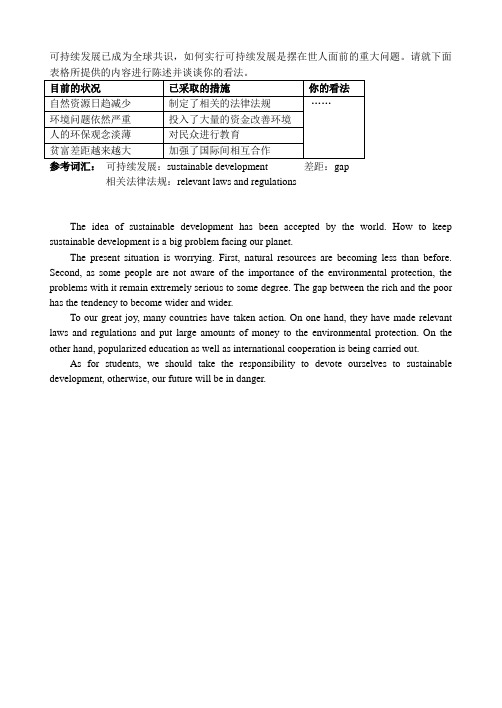
可持续发展已成为全球共识,如何实行可持续发展是摆在世人面前的重大问题。
请就下面表格所提供的内容进行陈述并谈谈你的看法。
目前的状况已采取的措施你的看法自然资源日趋减少制定了相关的法律法规……环境问题依然严重投入了大量的资金改善环境人的环保观念淡薄对民众进行教育贫富差距越来越大加强了国际间相互合作相关法律法规:relevant laws and regulationsThe idea of sustainable development has been accepted by the world. How to keep sustainable development is a big problem facing our planet.The present situation is worrying. First, natural resources are becoming less than before. Second, as some people are not aware of the importance of the environmental protection, the problems with it remain extremely serious to some degree. The gap between the rich and the poor has the tendency to become wider and wider.To our great joy, many countries have taken action. On one hand, they have made relevant laws and regulations and put large amounts of money to the environmental protection. On the other hand, popularized education as well as international cooperation is being carried out.As for students, we should take the responsibility to devote ourselves to sustainable development, otherwise, our future will be in danger.。

可持续发展可持续发展的定义:可持续发展(Sustainable development),是指在保护环境的条件condition下既满足当代the present age人的需求,又不损害后代later periods人的需求的发展模式可持续发展的意义和作用:实施可持续发展战略strategy,有利于促进promote生态organism’s habits效益、经济效益beneficial result和社会效益的统一。
有利于促进经济增长方式由粗放型向集约型转变,使经济发展与人口、资源resource、环境相协调coordinate。
有利于国民经济持续、稳定stabilize、健康发展,提高人民的生活水平horizontal/level和质量quality。
从注重lay stress on眼前利益、局部利益的发展转向长期利益、整体ensemble利益的发展,从物质resource资源推动型的发展转向非物质资源或信息资源(科技与知识)推动型的发展。
我国人口多、自然资源短缺、经济基础foundation 和科技水平horizontal落后,只有控制人口、节约practice thrift资源、保护环境,才能实现社会和经济的良性循环circulate,使各方面的发展能够持续有后劲。
三大原则公平性原则principle 持续性原则共同性原则基本内容经济可持续发展[2]生态可持续发展社会可持续发展人口世界人口联合国人口基金会1999年初公布的统计数字向人们展示了全球人口增长的历程:1804年世界人口只有10亿,1927年增长到20亿,1960年达到30亿,1975年达到40亿,1987年上升到50亿,1999年10月12日,世界人口达到60亿。
截至2005年6月,世界人口已达64.77亿。
中国人口2010年11月1日零时为标准时点进行了第六次全国人口普查:中国总人口为1370536875人美国人口据美国人口普查局2012年12月27日数据显示:到2013年1月1日,预计美国人口将达到3亿1509万1138人,比2012年新增加227万2462人,增长率为0.73%。

什么是可持续发展?
可持续发展 (Sustainable Development) 是八十年代提出的一个新概念。
1987年世界环境与发展委员会在《我们共同的未来》报告中第一次阐述了可持续发展的概念,得到了国际社会的广泛共识。
可持续发展是指既满足现代人的需求以不损害后代人满足需求
的能力。
换句话说,就是指经济、社会、资源和环境保护协调发展,它们是一个密不可分的系统,既要达到发展经济的目的,又要保护好人类赖以生存的大气、淡水、海洋、土地和森林等自然资源和环境,使子孙后代能够永续发展和安居乐业。
也就是江泽民同志指出的:“决不能吃祖宗饭,断子孙路”。
可持续发展与环境保护既有联系,又不等同。
环境保护是可持续发展的重要方面。
可持续发展的核心是发展,
但要求在严格控制人口、提高人口素质和保护环境、资源永续利用的前提下进行经济和社会的发展。
京都议定书
中文名称:京都议定书
英文名称:Kyoto Protocol
定义:1997年在日本京都召开的《气候框架公约》第三次缔约方大会上通过的国际性公约,为各国的二氧化碳排放量规定了标准,即:在2008年至2012年间,全球主要工业国家的工业二氧化碳排放量比1990年的排放量平均要低5.2%。
